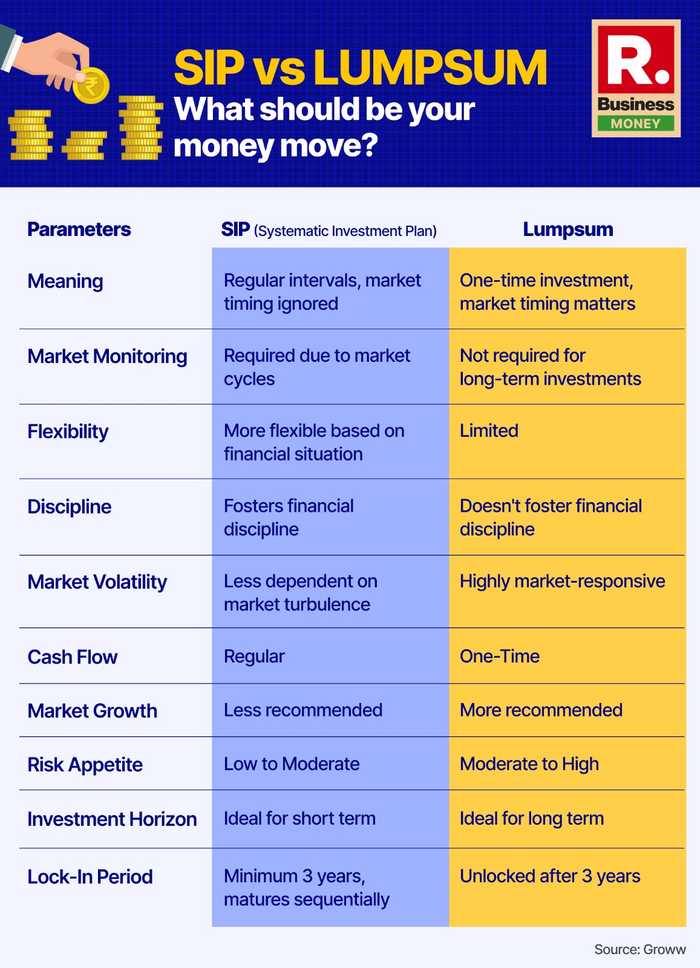Published 13:10 IST, July 30th 2024
SIP vs Lump Sum: Which investment strategy fits your needs?
Lump sum investing puts all your capital in at once, while SIPs involve regular monthly investments, accumulating units over time.
- Money
- 4 min read
SIP vs Lump Sum: Investors often face the dilemma of choosing between Systematic Investment Plans (SIPs) and lump sum investments. Both methods serve diverse financial goals and cater to different risk tolerances and investment horizons. Here’s a closer look at how SIPs and lump sum investments work and which might be better suited to your needs.

“For those with a regular monthly income, SIPs present a practical investment strategy. However, if you have a substantial amount ready for investment, putting it all into the market at once can be more advantageous. Keeping funds idle in a bank account incurs an opportunity cost that could diminish your long-term gains,” said Aastha Gupta, CEO of Share India FinCap.
Understanding SIPs and lump sum investments
Lump sum investing involves putting your entire capital into the market in one go. For example, if you invest Rs 1 lakh in an NIFTY 50 index fund, you acquire a proportionate number of units that reflect the NIFTY 50 index.
Conversely, SIPs involve making regular, periodic investments. For instance, if you decide to invest Rs 25,000 monthly in an NIFTY 50 Index Fund over 10 years, this amount is deducted from your bank account each month and invested into the scheme. You receive units based on your monthly investment and the Net Asset Value (NAV) for that month. Over time, these units accumulate and grow in value.
Benefits of SIP investments
- Rupee cost averaging: SIPs distribute investments over time, averaging out the cost and mitigating market volatility, leading to more stable returns.
- Investment discipline: SIPs automate contributions, ensuring consistent investment from your income.
- Managing market timing risks: SIPs buy more units when markets are down, lowering the average purchase price, which helps manage market fluctuations.
- Flexibility: SIPs allow adjustments in investment amounts, pausing contributions, or making withdrawals, accommodating various financial situations.
Who should consider SIP investments?
- New investors seeking a simple and disciplined investment approach.
- Young professionals with limited initial capital.
- Long-term investors focused on goals like retirement or education funding.
- Risk-averse individuals aiming to protect their investments from market volatility.
- People with inconsistent income streams.
- Retirees looking for a steady income source.
Advantages of lump sum investments
- Short-term goals: Lump sum investments are ideal for short-term financial objectives, especially in debt mutual funds, where SIPs might be less effective.
- Capitalising on windfalls: Ideal for those who receive a large sum through windfalls, inheritances, or asset sales.
- Market opportunities: Lump sum investments can be advantageous when seizing market opportunities during asset undervaluation or market downturns.
When to choose lump sum investments
Opt for lump sum investments in a rising market. During uncertain market conditions, Systematic Transfer Plans (STP) can be a useful alternative. STPs allow for transferring funds between mutual funds, which can potentially yield better results than keeping funds in a traditional savings account. By selecting short-term debt funds and equity funds within the same fund house, investors can navigate market fluctuations effectively.
Balancing SIP and lump sum investments
Deciding between SIP and lump sum investments depends on factors like the amount invested, alignment with financial goals, time horizon, risk tolerance, and the nature of investment objectives.
“It’s not necessarily a choice between SIP and lump sum; they can complement each other. The decision should align with your personal financial goals and risk profile. Regardless of the method, starting investments early is crucial to leveraging the benefits of compounding for long-term growth,” advised Amit Gupta, MD of SAG Infotech.
Experts recommend defining financial goals clearly and evaluating risk tolerance when investing in mutual funds.
“Diversify wisely, watch for low expense ratios, and remember that past performance doesn’t guarantee future results. Assess the fund manager's expertise, consider exit fees and taxes, and ensure your investment horizon aligns with your goals. Regularly monitor and adjust your investments to stay on track with your objectives,” Amit Gupta added.
Updated 10:20 IST, August 2nd 2024